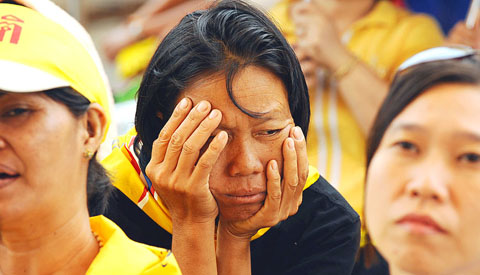A brother-in-law of ousted Thai prime minister Thaksin Shinawatra was elected Thai prime minister by parliament yesterday, but faced immediate opposition from protesters who vowed to force him from office.
Somchai Wongsawat, 61, called for reconciliation with protesters who have occupied the prime minister’s offices for the last three weeks to topple the government.
His predecessor, Samak Sundaravej, was removed from the post last week by a court that found he was illegally paid for hosting TV cooking shows.

PHOTO: AFP
Somchai, who is married to Thaksin’s politically powerful sister Yaowapa, will not take office until he is endorsed by Thai King Bhumibol Adulyadej, a process that could take several days.
“It’s undeniable who my relatives are, but I will do things the right way, to show my sincerity in trying to solve our problems,” Somchai told reporters after winning 298 votes in the 480-seat parliament.
“It’s about time for national reconciliation in Thailand,” he said.
“In the past we have had so many conflicts, but I personally don’t harbor any anger or hatred against anybody,” he said.
The parliamentary vote came almost exactly two years after Thaksin was toppled by the military following months of rallies by the same anti-government activists, known as the People’s Alliance for Democracy (PAD).
PAD quickly vowed to press ahead with their campaign to force Somchai and his entire People Power Party (PPP) out of government, with the ultimate goal of curtailing democracy in Thailand.
“We all know that he is Thaksin’s brother-in-law,” said Somsak Kosaisuk, a key PAD leader. “He is not only a nominee for Thaksin. He has direct relations. How can people accept this?”
Somchai was a respected career bureaucrat and former judge before entering public life. His wife Yaowapa was banned from politics following the coup against Thaksin.
Somchai was made a deputy PPP leader after winning a parliamentary seat, along with his daughter, in elections in December. He only became a prime ministerial candidate after Samak was removed from office last week.
The PPP leadership tried to return Samak to office in a parliamentary vote on Friday, but critics in the party boycotted the session.
Opposition leader Abhisit Vejjajiva urged Somchai to step out of Thaksin’s shadow and hold urgent talks with the anti-government protesters.
“The new prime minister must clearly show how he is going to ease the situation. He must work to erase any doubts,” Abhisit said.
The protesters accuse the ruling party of acting as a proxy for Thaksin, whom they accuse of widespread corruption.
They want to prevent Thaksin’s allies from winning power in elections by calling for a parliament where 70 percent of the seats would be appointed.
Meanwhile, the Supreme Court yesterday issued a third arrest warrant against Thaksin, ordering him to appear before the judges to hear their verdict in a land scandal.
Thaksin and his family have fled to Britain but maintain their innocence, claiming the charges are politically motivated.

CHIP WAR: The new restrictions are expected to cut off China’s access to Taiwan’s technologies, materials and equipment essential to building AI semiconductors Taiwan has blacklisted Huawei Technologies Co (華為) and Semiconductor Manufacturing International Corp (SMIC, 中芯), dealing another major blow to the two companies spearheading China’s efforts to develop cutting-edge artificial intelligence (AI) chip technologies. The Ministry of Economic Affairs’ International Trade Administration has included Huawei, SMIC and several of their subsidiaries in an update of its so-called strategic high-tech commodities entity list, the latest version on its Web site showed on Saturday. It did not publicly announce the change. Other entities on the list include organizations such as the Taliban and al-Qaeda, as well as companies in China, Iran and elsewhere. Local companies need

CRITICISM: It is generally accepted that the Straits Forum is a CCP ‘united front’ platform, and anyone attending should maintain Taiwan’s dignity, the council said The Mainland Affairs Council (MAC) yesterday said it deeply regrets that former president Ma Ying-jeou (馬英九) echoed the Chinese Communist Party’s (CCP) “one China” principle and “united front” tactics by telling the Straits Forum that Taiwanese yearn for both sides of the Taiwan Strait to move toward “peace” and “integration.” The 17th annual Straits Forum yesterday opened in Xiamen, China, and while the Chinese Nationalist Party’s (KMT) local government heads were absent for the first time in 17 years, Ma attended the forum as “former KMT chairperson” and met with Chinese People’s Political Consultative Conference Chairman Wang Huning (王滬寧). Wang

CROSS-STRAIT: The MAC said it barred the Chinese officials from attending an event, because they failed to provide guarantees that Taiwan would be treated with respect The Mainland Affairs Council (MAC) on Friday night defended its decision to bar Chinese officials and tourism representatives from attending a tourism event in Taipei next month, citing the unsafe conditions for Taiwanese in China. The Taipei International Summer Travel Expo, organized by the Taiwan Tourism Exchange Association, is to run from July 18 to 21. China’s Taiwan Affairs Office spokeswoman Zhu Fenglian (朱鳳蓮) on Friday said that representatives from China’s travel industry were excluded from the expo. The Democratic Progressive Party government is obstructing cross-strait tourism exchange in a vain attempt to ignore the mainstream support for peaceful development

ELITE UNIT: President William Lai yesterday praised the National Police Agency’s Special Operations Group after watching it go through assault training and hostage rescue drills The US Navy regularly conducts global war games to develop deterrence strategies against a potential Chinese invasion of Taiwan, aimed at making the nation “a very difficult target to take,” US Acting Chief of Naval Operations James Kilby said on Wednesday. Testifying before the US House of Representatives Armed Services Committee, Kilby said the navy has studied the issue extensively, including routine simulations at the Naval War College. The navy is focused on five key areas: long-range strike capabilities; countering China’s command, control, communications, computers, cyber, intelligence, surveillance, reconnaissance and targeting; terminal ship defense; contested logistics; and nontraditional maritime denial tactics, Kilby